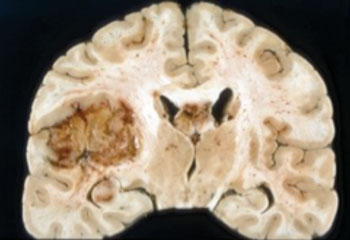How Blocking TROY Signaling Slows Brain Cancer Growth
By LabMedica International staff writers
Posted on 29 Nov 2015
Cancer researchers have found how the low molecular weight drug propentofylline (PPF) slows the growth of the aggressive brain tumor glioblastoma multiforme (GBM).Posted on 29 Nov 2015
This form of brain cancer is the most common primary tumor of the central nervous system and is almost always fatal. The aggressive invasion of GBM cells into the surrounding normal brain makes complete surgical removal impossible, significantly increases resistance to the standard therapy regimen, and virtually assures tumor recurrence. Median survival for newly diagnosed GBM is 14.6 months and declines to eight months for patients with recurrent GBM.

Image: Glioblastoma multiforme (GBM) (Photo courtesy of the University of California, San Diego School of Medicine).
Investigators at the Translational Genomics Research Institute (Phoenix, AZ, USA) reported in the November 12, 2015, online edition of the Journal of NeuroOncology that TROY (TNFRSF19 or tumor necrosis factor receptor superfamily, member 19), a member of the TNFR gene super-family, played an important role in GBM invasion and resistance. Knockdown of TROY expression inhibited GBM cell invasion, increased sensitivity to the standard chemotherapeutic agent temozolomide (TMZ), and prolonged survival in an intracranial xenograft model.
The investigators examined the effect of the low molecular weight drug propentofylline (PPF) on GMB. PPF is a xanthine derivative that is a phosphodiesterase inhibitor and adenosine reuptake inhibitor with purported neuroprotective effects. It had been extensively studied in Phase II and Phase III clinical trials for Alzheimer’s disease and vascular dementia where it demonstrated blood–brain permeability and minimal adverse side effects.
Results obtained during the current study showed that PPF decreased GBM cell expression of TROY, inhibited glioma cell invasion, and sensitized GBM cells to TMZ. Mechanistically, PPF decreased glioma cell invasion by modulating TROY expression and downstream signaling. Thus, PPF may provide a pharmacologic approach to target TROY, inhibit cell invasion, and reduce therapeutic resistance in GBM.
"We showed that PPF decreased glioblastoma cell expression of TROY, inhibited glioma cell invasion, and made brain cancer cells more vulnerable to TMZ and radiation," said senior author Dr. Nhan Tran, head of the central nervous system tumor research laboratory at the Translational Genomics Research Institute. "Our data suggests that PPF, working in combination with TMZ and radiation, could limit glioblastoma invasion and improve the clinical outcome for brain tumor patients. Clinical trials revealed that PPF can cross the blood-brain barrier, and has minimal side effects. PPF could be easily translated to the clinic as an adjuvant therapy in combination with standard of care treatment for GBM patients."
Related Links:
Translational Genomics Research Institute













